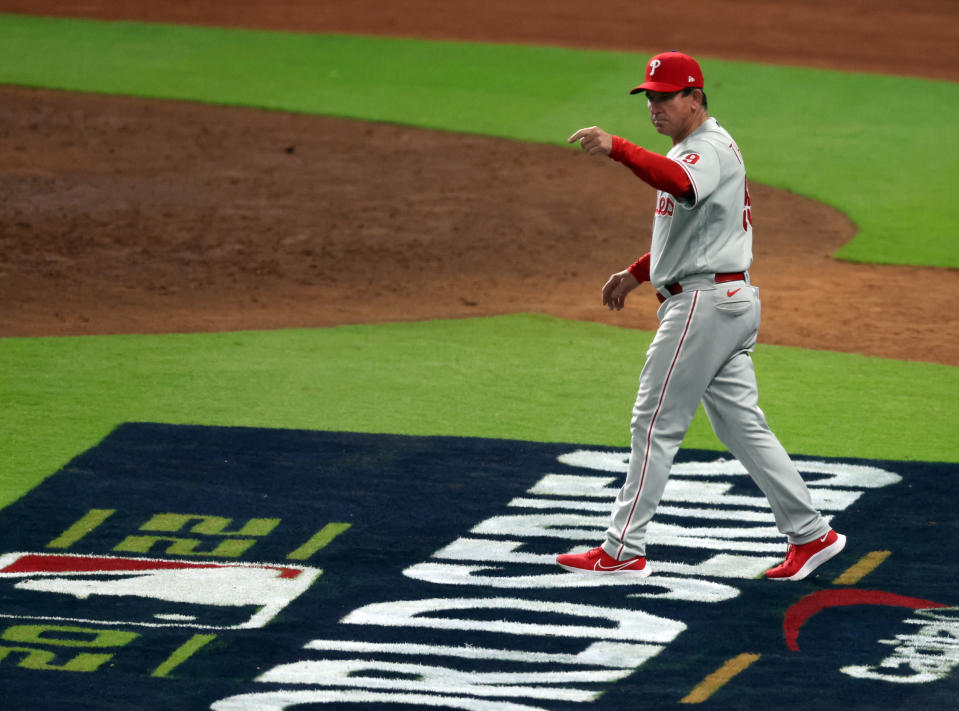If you’ve ever been caught on the highway in a blinding storm, you understand how the Philadelphia Phillies arrived here, at a World Series lead over the Houston Astros. When the challenge of making it through the present instant is all-consuming, you get lost in it. You stop making choices and just make moves. You take an inch, then the next inch, and then the next.
On Friday night, they stepped onto MLB’s biggest stage and cut through the latest obstacle, winning Game 1 over the 106-win Houston Astros, over the team that went up 5-0 after the third inning, over the team with the Hall of Fame-bound likely Cy Young winner on the mound. Catcher J.T. Realmuto tied the game with a double, won the game with a homer and caught 10 innings of white-knuckle baseball that these Phillies seem conditioned to withstand.
Postseason baseball restricts visibility. It amplifies danger and reduces reaction times. There is far less time for decision-making, for consideration.
Every moment could be decisive.
We know now that Realmuto’s mighty swings were the difference. But the Phillies only got there because — either on purpose or instinctively — they played every moment with similar urgency.


How Rob Thomson drove Phillies to Game 1 win
For the better part of … the whole season, the Phillies and interim-turned-permanent manager Rob Thomson have been grappling with the challenge of RIGHT NOW. They flipped a sub-.500 start and dreadful defense not into a division title or even a comfortable position, but into an 87-win finish that got them into the very last playoff berth — clinched when Aaron Nola flirted with a perfect game against these Astros, and committed to history when Bryce Harper pulverized a pennant-sealing homer against the San Diego Padres.
How they do it, how they looked doing it, it all ceased to matter weeks ago. The Phillies win like a toddler swims: Naturally, but out of pure necessity.
In a series of Game 1 choices, their move-now, worry-later attitude — more, uh, bluntly expressed earlier this week by pitcher Zach Eflin — paid off and separated them from the Astros.
The first of those choices came in the bottom of the fifth. After Kyle Tucker’s no-batting-gloves upper cut sent two home runs sailing into the Minute Maid Park seats early, the Phillies fought back against Astros ace Justin Verlander. They had rallied to tie it up in the top of the inning, with Houston manager Dusty Baker likely sticking with his ace too long.
Once the Phillies pulled even, there surely could have been temptation for Thomson to renew his own commitment to Nola. The veteran had righted the ship. He came out for the bottom of the fifth and retired his sixth straight batter — Jeremy Peña — on a strikeout. But with terrifying Astros slugger Yordan Alvarez coming to bat, Thomson marched to the mound and summoned José Alvarado, his best left-handed reliever.
Don’t tell Eflin, but this is also playing smart in the brainy way. Thomson understood the leverage of the moment. Alvarez was the Astros batter most capable of transforming the tenuous, even footing of a tie right back into the uphill climb of a deficit. Whatever gave him the best chance of avoiding that particular disaster was the best move, even if it meant answering that question again in a later inning.
Alvarado got Alvarez to pop out on a nasty 99-mph sinker.
‘You don’t have a choice but to be locked in’
In the seventh inning, the Phillies exhibited their focus in a different way. With two outs against (absolutely filthy) Astros reliever Bryan Abreu, Realmuto was at the plate and Kyle Schwarber was on first. The slugger had reached on a grounder that deflected off of the pitcher and confounded Jose Altuve. On a 2-1 count, the beefy power hitter took off for second.
Schwarber surprised everyone, getting a huge jump on a breaking ball and sliding in relatively easily to put himself in scoring position. Even though he was ultimately stranded, that’s a potentially game-winning play when you don’t know what’s coming next.
Two-and-a-half innings later, with the Astros looking to break the tie in the bottom of the ninth, Realmuto made the Schwarber steal of throws — firing an ambitious rocket to try and cut down Altuve at second. It was shockingly close because of Realmuto’s pinpoint throw and Jean Segura’s semi-miraculous catch/tag combo, and replay review only upheld a safe call.
What actually kept Altuve from scoring and the Astros from walking off with Game 1? A sprawling, sliding grab from Nick Castellanos, one of the worst-rated defensive outfielders in baseball. After the game, he didn’t pretend that his catch was part of any master plan.
In a remarkably honest moment with Ken Rosenthal, Castellanos said he simply knew he was “going to do everything he could not to let it drop.” He admitted he sometimes had trouble maintaining attention on defense during the slog of the regular season. The postseason, though, that’s different.
“You don’t have a choice but to be locked in,” Castellanos said, “Watching swings, watching the balls come off the bat.”
No choice. That’s the reality of the postseason. And it’s the reality the Phillies have lived in all year.
Thomson’s initial aggression carried his team into and through a bullpen showdown with the deep Astros staff. He deployed likely Game 3 starter Ranger Suarez for two outs that coincided with Alvarez’s next at-bat. He got five outs from his best reliever, Seranthony Dominguez. And when the Phillies finally took their first lead, he handed the ball to David Robertson — not because he had plotted this ending, but because he had steered hard away from losing. Over and over. Until he pulled into a win.
